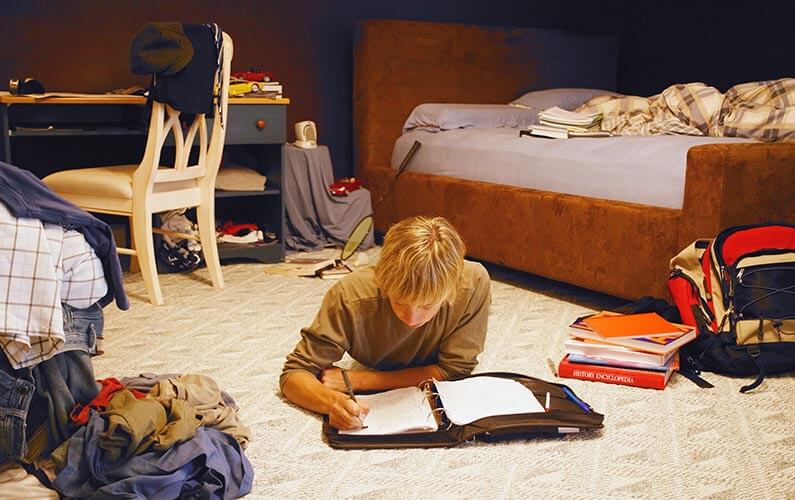Picture this: you’re walking down the hallway in your home when your eye catches a glimpse of an enormous pile of clothing festering behind the semi-closed door of your teenager’s room.
You open the door and your heart starts pounding at the site of clothes strewn on the floor, an unmade bed, trash on the floor next to the trash can …
“What were you thinking?!” you exclaim. “Can’t you smell that stench? The rest of the house doesn’t look like this. I don’t model this behavior!” (Okay, maybe those aren’t your exact words. Add your preferred expletives as needed.)
As I think about raising my own four kids (who were great teens overall), I can recall asking myself that exact question in all kinds of scenarios! What, in fact, were they EVER thinking?
A teenager’s messy bedroom is ALMOST as universal as death and taxes. The dedication to detail they may show in other parts of their lives doesn’t necessarily translate to maintaining a clean living space.
Understanding the Teenage Brain
So what exactly is rattling around in those teenage heads of theirs? Hormones for sure. They are forming their self-identity in the context of their families, their school culture, and the larger community around them.
They have academics to keep up with, sports or music, and let’s not forget the elephant in every room—their social media presence. Fresh bedsheets and a vacuumed floor often don’t make the cut for the “things I must pay attention to” list.
There is actually a wealth of information available publicly on the topic of the teen brain and how it works, including
- a wonderful video by PBS titled “Inside the Teenage Brain,”
- this New York Times piece “How to Help Teens Weather Their Emotional Storms,”
- this great video out of UC San Diego by adolescent psychiatrist Jay Giedd called “The Amazing Teen Brain,” and
- a book by Daniel J. Siegel, MD, titled “Brainstorm: The Power and Purpose of the Teenage Brain.”
Your Response Matters
While that very common response, “It’s MY ROOM,” is likely to cause a visceral, “but it’s MY HOUSE!” response from many parents, the family leadership approach necessitates in situations like this to read between the lines and really hear what your child is saying but not saying.
“It’s MY ROOM” effectively translates to: “I need privacy. I need control over something in my life. I need a safe space. I need you off my back because I have too much else going on right now.”
Can you empathize with that feeling? Do you remember feeling that way as a teenager? Do you feel that way now?
It is your house, and no child or teen gets to lock the door and ignore the rules of the home. If having a clean room is high on YOUR priority list, but not your teen’s however, start to reconcile with your child by dropping the power struggle. “Clean your room or you’re grounded” is not a constructive solution.
The Leadership Approach to Taming the Messy Bedroom
01 – Have a Calm Conversation
When you’re ready, start by having a calm and respectful discussion about why the room needs to be kept up. Your words will depend on your own set of values but might include something like:
“This is our shared home. None of us get to leave it a mess. I understand you need to feel like your room is your private space, and I am willing to work with you on that. The way things are now, though, are not acceptable.
“We waste time and energy looking for stuff that’s lost under your bed. I’m frustrated with spending more and more money on (fill in the blank) that gets trashed very quickly. I know you have a lot going on with school and your friends, but our family needs you to pay attention to this so we all feel comfortable in our home.”
Then listen to what they have to say and address it to the best of your ability.
02 – Define Your Terms
Work together to establish exactly what a “clean” and “organized” bedroom will look like when it’s done. Compromising your adult vision of perfection gives some power and authority to your child to be in charge of their space within the context of your family rules.
For example:
- “Clothes need to be in the closet” may result in a teen simply transferring that pile from the bedroom floor to the floor of the closet. Perhaps hangers are an insurmountable burden for your teen at this point ????, but folded shirts and pants on shelves is tolerable. Help them out and get a small dresser or some hanging closet shelves to make that compromise possible.
- “Clean sheets on the bed” should include instructions on what to do with the dirty ones. This is a great time to teach your kids some basic laundry skills if you haven’t already. A new pair of sheets, picked out by your child, can also be a great inspiration for taking pride in their space.
- Open the windows, turn on the fan, or put on the air filter for this room immediately!
03 – Establish a Schedule
A regular schedule is part of keeping your child accountable.
For example:
- The room needs to be vacuumed/swiffered twice a month.
- The sheets need to be washed every week.
- All dishes need to be taken back to the kitchen and washed each morning.
04 – Agree On the Consequences
Work together to establish consequences of not keeping their room in the agreed upon condition. Instead of an arbitrary grounding or loss of privilege, try letting them come up with a reasonable consequence and hold them to it!
Like everything in parenting, your consistency is paramount to establishing respect in the home.
Agree to check-in at regular intervals (i.e., once a month), to see if your changes are working and evaluate if you or your teen needs anything additional in order for your changes to hold for the long term.
05 – Let Them Direct the Process
If they need some help cleaning out old stuff, look at this great story about clearing your space and grab your free download to get started.
As your teen prepares to become an independent adult, remember one thing, they’re still practicing. Just because they’re adult-sized doesn’t mean they have the reasoning capabilities of a person with a mature brain.
At nearly every age, children need guidance and parameters to work within, authority to make their own decisions, and the responsibility to deal with the consequences of those choices.
What To Do Next
1. Read more in the blog:
The Family Wisdom Blog shares valuable ideas across diverse topics.
2. Explore the Printables Library:
Our printables library is filled with must-have activity ideas, checklists, guides, and workbooks.
3. Subscribe to Our Newsletter:
Sign up for our newsletter for parenting tips to help you create the family team you've always wanted.
Rick Stephens
Rick Stephens is a co-founder of Raising Families. With 33 years of experience as a top-level executive at The Boeing Company and having raised four children of his own, he is able to support parents and grandparents by incorporating his knowledge of business, leadership, and complex systems into the family setting.
In his free time Rick enjoys road biking, scuba diving, visiting his grandkids, and generally trying to figure out which time zone he’s in this week. Read full bio >>





